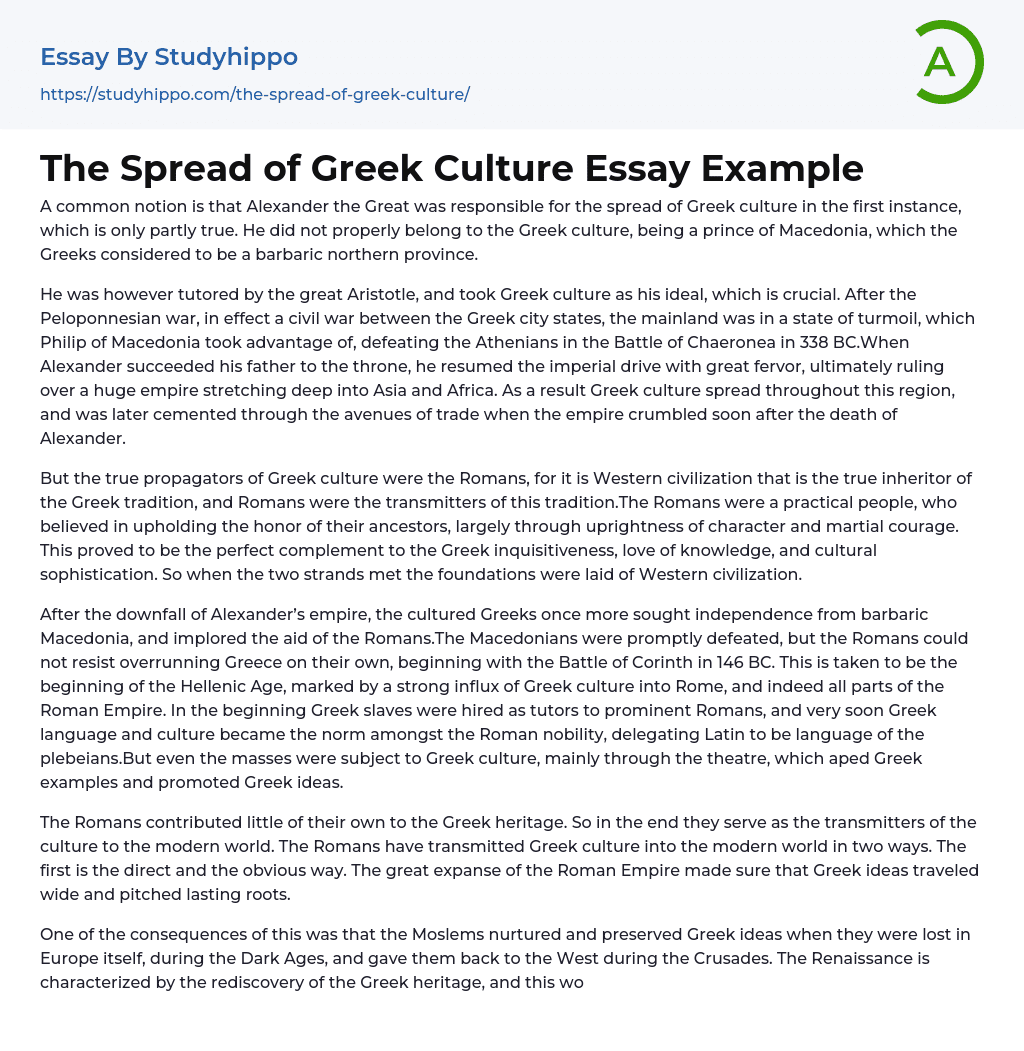A common notion is that Alexander the Great was responsible for the spread of Greek culture in the first instance, which is only partly true. He did not properly belong to the Greek culture, being a prince of Macedonia, which the Greeks considered to be a barbaric northern province.
He was however tutored by the great Aristotle, and took Greek culture as his ideal, which is crucial. After the Peloponnesian war, in effect a civil war between the Greek city states, the mainland was in a state of turmoil, which Philip of Macedonia took advantage of, defeating the Athenians in the Battle of Chaeronea in 338 BC.When Alexander succeeded his father to the throne, he resumed the imperial drive with great fervor, ultimately ruling over a huge empire stretching deep into Asia and Africa. As a result Greek culture spread throughout this region, and was
...later cemented through the avenues of trade when the empire crumbled soon after the death of Alexander.
But the true propagators of Greek culture were the Romans, for it is Western civilization that is the true inheritor of the Greek tradition, and Romans were the transmitters of this tradition.The Romans were a practical people, who believed in upholding the honor of their ancestors, largely through uprightness of character and martial courage. This proved to be the perfect complement to the Greek inquisitiveness, love of knowledge, and cultural sophistication. So when the two strands met the foundations were laid of Western civilization.
After the downfall of Alexander’s empire, the cultured Greeks once more sought independence from barbaric Macedonia, and implored the aid of the Romans.The Macedonians were promptly defeated, but th
Romans could not resist overrunning Greece on their own, beginning with the Battle of Corinth in 146 BC. This is taken to be the beginning of the Hellenic Age, marked by a strong influx of Greek culture into Rome, and indeed all parts of the Roman Empire. In the beginning Greek slaves were hired as tutors to prominent Romans, and very soon Greek language and culture became the norm amongst the Roman nobility, delegating Latin to be language of the plebeians.But even the masses were subject to Greek culture, mainly through the theatre, which aped Greek examples and promoted Greek ideas.
The Romans contributed little of their own to the Greek heritage. So in the end they serve as the transmitters of the culture to the modern world. The Romans have transmitted Greek culture into the modern world in two ways. The first is the direct and the obvious way. The great expanse of the Roman Empire made sure that Greek ideas traveled wide and pitched lasting roots.
One of the consequences of this was that the Moslems nurtured and preserved Greek ideas when they were lost in Europe itself, during the Dark Ages, and gave them back to the West during the Crusades. The Renaissance is characterized by the rediscovery of the Greek heritage, and this would not have been possible without the Roman adoption of Greek culture. But this culture has also come down to us in an indirect and subtle way, which is through Christianity.Though not philosophically bent, the Romans took to certain Greek philosophical ideas, such as Platonism and Stoicism. Recently scholars have determined that these two philosophies were instrumental in the
formation of Christianity, and that Greek ideas have found fruition in the latter. So, even with the triumph of Christianity, after the downfall of the Roman empire, we see the persistence of Greek influence.
- Alexander The Great essays
- Sparta essays
- Popular Culture essays
- Car Culture essays
- American Culture essays
- Mormon essays
- Indian Culture essays
- Mexican Culture essays
- Pop Culture essays
- Cultural Differences essays
- Culture Shock essays
- Different Cultures essays
- Ancient Rome essays
- Augustus essays
- Byzantine Empire essays
- Julius Caesar essays
- Roman Republic essays
- Mark Antony essays
- 1920S essays
- 1950S essays
- 1960S essays
- 19Th Century essays
- 20Th Century essays
- Ancient Greece essays
- Bravery essays
- British Empire essays
- Civilization essays
- Colonialism essays
- Declaration of Independence essays
- Evidence essays
- Genocide essays
- Gilded Age essays
- Historical Figures essays
- Historiography essays
- History of the United States essays
- Letter from Birmingham Jail essays
- Louisiana Purchase essays
- Nazi Germany essays
- Rebellion essays
- Revolution essays
- Roman Empire essays
- Russian Empire essays
- The Columbian Exchange essays
- Vikings essays
- War essays
- What is History essays
- World History essays
- World Hunger essays
- Caste System essays
- Citizenship essays




